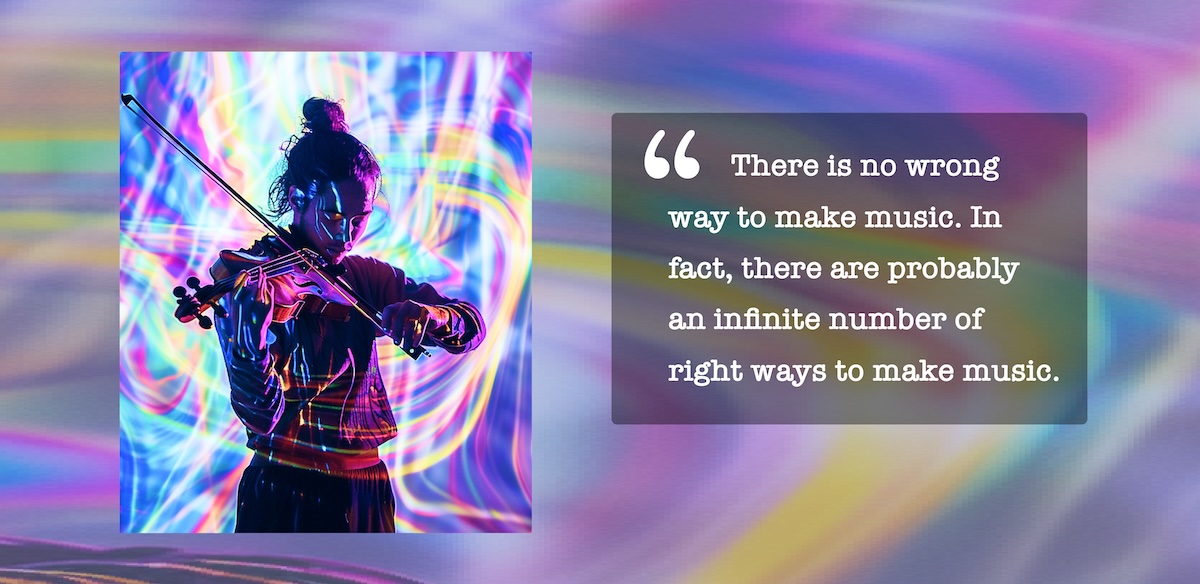There is no wrong way to make music. In fact, there are probably an infinite number of right ways to make music.
Here are a few creative principles to guide music makers:
- Do the thing, i.e. take action and start creating.
- Get inspired. Find inspiration in music, sounds, or anything that moves you.
- Play. Experiment.
- Aim to create and capture magical musical moments.
- Develop a creative process.
- Seek a seamless song creation flow by effectively integrating instruments, tools, and techniques.
- Use templates, a defined studio setup, and favorite presets to minimize friction, conserve creative energy, and make getting started easy.
- Aim at tangible creative outcomes.
- Reflect regularly
- Beware of ‘tool-itus’—the obsession with collecting, tweaking, and perfecting gear and techniques, which can lead to a counterproductive focus on consumerism and perfectionism.
- Perfect your music studio for you. But don’t be too fancy. Minimal tools for maximal output.
- Don’t Forget: “Purely by hard work, one can become an artist” - Robert Fripp
- Seek music pleasure for your ears.
- Always be willing to learn and grow.
- Try new identities and experiment with various genres.
- Explore continuously new musical landscapes.
- Be organized.
- Work the process. Work your process. Rinse. Repeat. Finish.
- Become a connoisseur of all music. Get interested in a few and find new music gems at the intersections.
- Push your skills through practice and through creation.
- Be comfortable setting songs aside for later. If a song doesn’t come together today, pause and revisit it later when it might click.
- Be flexible. Find rules. Then break them.
Concluding Thoughts: Creative Habits to Creative Momentum and Beyond
To repeat a lesson I fortunately was able to internalize early in my music making and skill building journey: We don’t make albums. We don’t make songs. We make a song. Then we make another.
Beyond just getting interested in music and learning enough to get started, the fundamental thing is doing the thing and then continuing to improve at it. I refer to this as “skilled practice,” and it describes our ability to use our cognitive, technical and often manual skills to do or produce.
Anyone can cultivate a life of skilled practice. As guitarist and Brian Eno Collaborator, Robert Fripp says, “Purely by hard work, one can become an artist.” Obviously, an expert will have gained heighten skills and honed mental models, but ultimately it’s about pushing your skills regularly and seeking flow. Most arts and experts still maintain a beginner’s mind and mindset. For many activating skilled practice leads to a thriving, flourishing, happy life too.
I believe at the core of a productive creative life are creative habits. Whatever your artistic medium or professional practice, the fundamentals seem consistent: Stay healthy. Get enough sleep. Eat well. Exercise. Maintain a low stress but challenging and learning life. Find and carve out dedicated time to your craft. Then show up and do it.
Having now started and finished four albums (as well as a host of other personal and professional projects), I’ve come to recognize the importance of keeping the creative project going beyond just the sporadic single session. Flow in the the moment is essential, but I also believe in a higher order, progress-building form of longer-term flow we might call “creative momentum.”
Creative momentum is the combination of making progress and feeling good about it. It’s the positive feelings you get from the continued forward movement on a creative project or piece of art. It’s an extended flow state that could last days, weeks, months or even years, where you are producing and ideally finishing “great” work. It’s a period where you are engaged in your creative process and your primary creative activities while also maintaining an awareness of the final product or goal.
There are many factors that contribute to cultivating creative habits, maintaining them and hopefully gaining positive creative momentum. Personally I find music spreadsheets useful and also believe reflection and journaling in various forms are under-recognized and under-utilized. We sometimes get stuck creatively and personally. Reflection helps you express what you are feeling, identify challenges and align yourself with, well, yourself. Journaling can help you better understand your current situation and guide you in taking appropriate actions.
It’s important to realize that each song and artistic endeavor represents a distinct outcome and journey. Unfortunately, the milestones on this path to completing and releasing music are mostly internal, and there are no definitive and universally applicable guideposts to get us there. The best approach is to take creative steps, relying on our ears and feelings to determine when our work is ready to be shared. As musician Jerry Jeff Walker famously said, “The only way to know how much is enough is to do too much, and then back up.”
I hope these notes to a music producer, music maker self can help you as they continue to help me.
Best of luck and happy music making.
Got a comment? Send me an email.
AIDA (AI Disclosure Acknowledgement): This post was written entirely by me. I leveraged an AI system (ChatGPT-4) for spellcheck and minor revisions.

